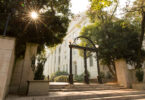“For a long time I would go to bed early.”
That short, direct sentence is the jumping-off point for the longest novel ever written, French writer Marcel Proust’s In Search of Lost Time, or as it was known in English for decades, Remembrance of Things Past.
Now, a hardy band of “Proustkateers” under the leadership of UGA’s Andrew Zawacki, a critically acclaimed poet, translator and editor (and member of the creative writing faculty in the English department) is finishing a year-long study of the Proust masterpiece-the first time it has ever been taught in full on the Athens campus.
“I absolutely love our Proust class, and I think a large part of that is due to Andrew Zawacki, who is an absolutely fantastic professor,” said senior Kate Morrissey. “As for the book itself, I feel it influencing my take on everything else that I read, as well as my daily life.”
Morrissey’s reaction isn’t unusual. In a recent Thursday morning class, the 10 students in Room 251 of Park Hall argued, laughed and in general spoke of the book’s characters as old friends or as people they wouldn’t trust with a single franc.
Zawacki’s herculean effort began last August when an astonishing 24 students signed up for the first half of the year-long study of the seven novels (in English translation) that make up the entire Proust work. The rules for taking the class were simple: Anyone taking the second semester must take the first, but a student could take part one without taking part two.
While Zawacki has a growing international reputation as a poet and translator, his life changed when, in 2001, he first read ISOLT (as the novel’s title is now commonly abbreviated) during the summer (prior to studying the book, under Nobel Prize-winning writer
J.M. Coetzee and philosopher Jonathan Lear in The Committee on Social Thought at the University of Chicago) and became utterly engrossed with the elaborate world that Proust constructs around events in France during the late 19th and early 20th centuries.
“Though I didn’t see the book as being about my life or anything like that, I found it disorienting, and it completely changed the way I looked at writing and experience,” said Zawacki, both a Rhodes and Fulbright Scholar
He read the entire book again a few years later and not long after discovered, to his amazement, that no one had ever taught the entire novel at UGA, either in the original French or in English, both departments in the Franklin College of Arts and Sciences. (The current course is co-listed in the English and French departments.)
The experience has been just as disorienting-and rewarding-for students as it was for Zawacki the first time he read it.
“I never thought I would stay in this class through all the books,” said Jordan Stepp, a junior journalism major. “I was so intimidated the first day of class by the reading schedule that I actually dropped the section only to re-add it later. Now I’m almost completely through with a work that only a few people can say they’ve read in its entirety. It has been an intense experience that has drawn me closer to the work in a personal way and to my classmates and professor who are experiencing the same mind warp that is In Search of Lost Time.”
Zawacki brings to the classroom a broad intellectual background and a deep reading of useful texts, such as German philosopher G.W. Hegel’s Phenomenology of Spirit and Sigmund Freud’s Beyond the Pleasure Principle, which open for the class new insights into such things as forms of fiction and the thicket of themes, structures and ideas that Proust wove through his massive opus.
Still, one characteristic that students bring to the class is a relentless desire to meet and conquer one of the cornerstones of 20th century literature, a novel that requires a huge commitment of time and interest.
One class participant, Elizabeth Tucker, actually graduated with a bachelor’s in English in 2007 but came back to work on coursework for other degrees. Thus, she wasn’t required to take the course, and it doesn’t count toward graduation.
“This is quite possibly one of the best courses I have ever taken at UGA,” said Tucker. “The blend of incomparable literature, fascinating subject matter and an amazing professor has created a once-in-a-lifetime class.”
Interested students (and faculty) are already asking Zawacki when he might teach the class again. He isn’t sure, but the path-breaking class will remain an indelible experience for the group just now finishing the work.
Though the year-long immersion in the world of Proust may sometimes have led to a kind of literary claustrophobia for the class, its recent lively discussion shows that students find the class not time lost but time well spent.




